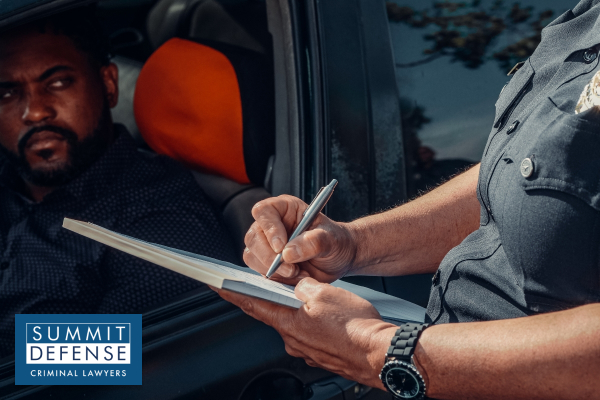Understanding Miranda Rights
These rights shield criminal suspects when talking to police. Let's look at the basic concept of Miranda Rights and where they came from.
Core Components of Miranda Rights
Miranda Rights have four main parts that law enforcement officials must tell every suspect in custody:
- You have the right to stay silent
- What you say can be used as evidence at trial against you
- You can have a lawyer with you
- If you can't pay for a lawyer, one will be provided at no cost
These rights help balance power between you and police departments. The typical warning stops you from making self-incriminating statements that could become evidence of guilt at your criminal trial.
Historical Background and Legal Foundations
Miranda warnings began with a 1966 Supreme Court case. Ernesto Miranda was found guilty of armed robbery after he made a confession before police could read him his rights. The Court made a majority opinion that this broke his constitutional rights.
Since then, Miranda Rights have become a key criminal procedure rule. They protect criminal defendants during police questioning. Without these warnings, your response to police questioning might lead to an incriminating statement that hurts you in court.
Importance of Miranda Rights
 Your Miranda Rights shield you from unfair police tactics. Here's why these protections matter in criminal defense situations.
Your Miranda Rights shield you from unfair police tactics. Here's why these protections matter in criminal defense situations.
Protecting Suspects During Custody
Miranda Rights protect suspects in custody. Being at a police station limits your freedom of movement and causes stress. A reasonable person would feel pressure to talk.
The right to stay silent lets you avoid making voluntary statements that prosecutors can use against you. Crime movies often show this wrong—in real life, staying quiet and asking for legal advice is usually best.
These rights are especially important for disabled persons who might need extra help understanding questions. Having a dedicated attorney during interrogation by police helps prevent coercive police activity.
Influence on Police Interrogations
Miranda warnings have changed how police handle questioning. Officers must make sure you understand your rights before the original interrogation begins. This helps stop coercive interrogation tactics that might lead to false confessions.
The warnings help judges decide if your statements were truly voluntary. Courts look at whether police properly warned suspects when deciding on the admissibility of evidence at trial. This creates important protections during custodial police interrogation.
When Are Miranda Warnings Required?
Police don't always need to read your rights. Knowing when they must can help protect you from making harmful statements.
Definition of Custodial Interrogation
Police only need to read Miranda warnings during "custodial interrogation." This means two things must happen. First, you must be in a custodial situation where you lack freedom of action. This doesn't always mean actual arrest, but your freedom of movement must be limited.
Second, police must ask questions to obtain information about the crime. Not all questions count as interrogation. Standard booking questions like your name and address don't need Miranda warnings.
Police often try to get information without triggering warning requirements. They might say you're "just helping" as they create custodial circumstances around you. Even as a suspect, what you say before being taken into custody can become documentary evidence against you.
Examples of Scenarios Requiring Warnings
Law enforcement officers must read your rights when:
- They arrest you and take you to the station for questioning
- A defendant in custody is asked about criminal acts
- They question you at home and won't let you ask them to leave
- Any dangerous situation where you're not free to end the talk
Not all police contacts need warnings. Brief questions on the street don't require Miranda warnings. Traffic stops are tricky—quick questions during a stop usually don't need warnings unless the stop becomes more serious.
Exceptions to Miranda Warnings
 Even though Miranda Rights protect American freedoms, they don't apply in every situation. Here's when police can question you without warnings.
Even though Miranda Rights protect American freedoms, they don't apply in every situation. Here's when police can question you without warnings.
Pre-Arrest Questioning Scenarios
Not all talks with police need Miranda warnings. If you freely speak with law enforcement and maintain freedom of action, they don't need to read your rights. If you agree to talk with detectives but aren't under custody by police, your answers might be used without warnings.
During traffic stops, police can ask for your license without Miranda warnings. These brief stops don't count as custody. Remember, though, you can still refuse to answer questions that might lead to self-incriminating statements.
Many don't realize that what they tell officers before arrest can become substantive evidence at trial. This is why talking to a criminal lawyer before answering police questions protects your interests.
Public Safety Exception
The Supreme Court created a "public safety" exception to Miranda. When quick questions might prevent harm, officers can ask without first giving warnings.
For example, if police arrest someone and need to find a hidden weapon, they can ask where it is without reading rights. This only works for questions to stop immediate threats—not for gathering additional evidence about past crimes.
This exception shows why you need an affordable defense attorney who understands these issues. A lawyer with legal experience can spot when officers wrongly use this exception to bypass your 6th Amendment protections.
Consequences of Failing to Give Miranda Warnings
When police ignore warning requirements, it affects your whole case. Here's what happens when officers commit warning violations.
Suppression of Evidence
If police don't give proper Miranda warnings before questioning, courts can throw out your statements. Your attorney can file a motion arguing that Miranda-defective statements shouldn't be used against you.
Beyond direct statements, courts may exclude "derivative evidence"—tangible evidence police found because of what you said. This rule applies to both physical items and testimonial evidence from others.
When courts find violations, they can exclude the arrestee's pre-Miranda statements and evidence discovered through them. When key evidence is thrown out, this often leads to the dismissal of charges.
Impact on Charges and Cases
Miranda violations can transform your criminal proceeding. Without key evidence, prosecutors might have to:
- Proper handling of these issues becomes vital for serious charges where statements play a big role
A good defense strategy often includes checking for Miranda violations. Even when violations don't get your case dismissed, they can improve your position during talks with prosecutors.
Proper handling of these issues becomes vital for serious charges where statements play a big role. When a defendant objects to how statements were obtained, courts must decide if the police followed proper procedures.
Waiving Miranda Rights
You can give up your Miranda Rights, but this choice seriously affects your case.
Voluntary Versus Accidental Waiver
You can legally waver your Miranda Rights, but it must be your choice. This means you understand what rights you're giving up, and nobody forced you. Courts look at whether you gave a clear affirmative answer showing you understood.
Common waiver questions arise when suspects start answering after hearing rights without clearly saying they understand. Even staying quiet and then answering can sometimes count as a waiver.
A defendant in custody can easily make mistakes during this process. This is why having competent counsel during police questioning protects you from making harmful statements under pressure.
Legal Implications of Waiving Rights
Waiving your rights can badly damage your case. Once waived, your statements become evidence against you in judicial proceedings. These statements are hard to challenge later, even if you change your mind.
Many suspects think they can talk their way out of trouble. They don't realize that interrogation techniques are designed to get information to use against you. Without legal counsel, you might not recognize when your answers could harm your case.
We strongly suggest talking to a defense attorney before waiving any rights. This decision can change your whole case. Even a court-appointed attorney helps if you can't afford your own lawyer.
Importance of Miranda Rights in Different Legal Contexts
 Miranda Rights work differently depending on your situation. Here's how they apply in various cases.
Miranda Rights work differently depending on your situation. Here's how they apply in various cases.
Specific Considerations in DUI Cases
In DUI cases, Miranda Rights mix with other legal issues. During normal DUI stops, roadside questions and sobriety tests usually don't need warnings because they happen before arrest. But once you're under arrest, any further questioning needs proper warnings.
DUI cases often involve both physical evidence (breath tests) and your statements about drinking. Understanding when Miranda applies helps decide what evidence might be thrown out.
The timing of arrest in DUI cases creates complex issues. Having an attorney before questioning can help protect your rights throughout the case.
Miranda Rights in Other Criminal Charges
Miranda Rights matter differently depending on the charges you face:
- In drug cases, statements about who owned substances can be key evidence
- For theft crimes, admissions about what happened often make or break the case
- In violent crime investigations, intensive questioning makes Miranda protection essential
Police use different interrogation techniques based on the crime. They might show crime on video or mention evidence they claim to have. Without proper warnings, such tactics can violate your constitutional rights.
Each criminal charge presents unique custodial interrogation issues. A who understands these differences can better protect you.
What to Do If Your Miranda Rights Are Violated
Knowing how to respond when your rights are violated can save your case. Here's what to do.
Recognizing a Violation
You might have experienced a Miranda violation if:
- Police questioned you in custody without reading rights
- They continued after you requested a lawyer
- They used the coercive nature of questioning to pressure you
- They ignored your attempt to stay silent
Write down everything about the encounter, including whether you could leave, what questions they asked, and how officers responded if you tried to use your rights. This information helps your lawyer spot problems with your questioning.
Remember that invoking your right to stay silent must be clear. Just staying quiet may not be enough. Clearly stating "I want a lawyer" or "I'm using my right to remain silent" leaves no room for confusion.
Consulting with a Legal Professional
Call a criminal defense attorney immediately if you believe your Miranda Rights were violated. An experienced lawyer can review what happened during questioning and determine if officers violated criminal procedure statutes.
Your attorney can file motions to throw out defective statements or evidence obtained through violations. They can also negotiate with prosecutors or present strong opinions about these violations as part of your defense.
The sooner you talk with a lawyer after a possible violation, the better they can protect your rights. Many offer free consultations to discuss your case through their online contact form.
Our Bay Area Criminal Defense Lawyers Protect Your Rights
Having skilled legal representation makes all the difference when facing criminal charges. Our team knows how to defend your constitutional issues.
Why Miranda Rights Matter in Criminal Cases
Miranda Rights create a crucial shield against aggressive police tactics. When properly used, they ensure suspects can make informed choices during questioning. For our clients facing charges, understanding these key concepts can mean the difference between conviction and acquittal.
Most people don't understand these legal protections. Our attorneys fill this gap, ensuring your rights stay protected throughout commitment proceedings and challenging any violations during police custody.
How Summit Defense Can Help If Your Rights Are Violated
At Summit Defense, we check for Miranda violations in every case. Our defense attorneys know how to spot situations where police failed to give proper warnings or wrongly used the jail house informant exception.
We regularly file and win motions to suppress evidence based on Miranda violations. Our knowledge of Department of the Army Form 3881 and other police procedures helps us notice issues other lawyers might miss. When we find violations, we use them to strengthen your defense.
Contact a Bay Area Criminal Defense Lawyer for a Free Consultation
 If you face criminal charges or believe police violated your Miranda Rights, get legal help now. Our team has the knowledge to protect your rights and fight for the best outcome in your case.
If you face criminal charges or believe police violated your Miranda Rights, get legal help now. Our team has the knowledge to protect your rights and fight for the best outcome in your case.
We offer free, confidential consultations to discuss your situation. Contact Summit Defense today by calling our office or filling out our online contact form. What you tell police can greatly impact how your case turns out—ensure you have strong legal representation before answering any questions.
 At Summit Defense, our criminal lawyers help people who talk to law enforcement officers. Knowing your legal rights prevents you from giving bad answers when police take a suspect into custody.
At Summit Defense, our criminal lawyers help people who talk to law enforcement officers. Knowing your legal rights prevents you from giving bad answers when police take a suspect into custody.

 Your Miranda Rights shield you from unfair police tactics. Here's why these protections matter in criminal defense situations.
Your Miranda Rights shield you from unfair police tactics. Here's why these protections matter in criminal defense situations. Even though Miranda Rights protect American freedoms, they don't apply in every situation. Here's when police can question you without warnings.
Even though Miranda Rights protect American freedoms, they don't apply in every situation. Here's when police can question you without warnings. Miranda Rights work differently depending on your situation. Here's
Miranda Rights work differently depending on your situation. Here's  If you face criminal charges or believe police violated your Miranda Rights, get legal help now. Our team has the knowledge to protect your rights and fight for the
If you face criminal charges or believe police violated your Miranda Rights, get legal help now. Our team has the knowledge to protect your rights and fight for the